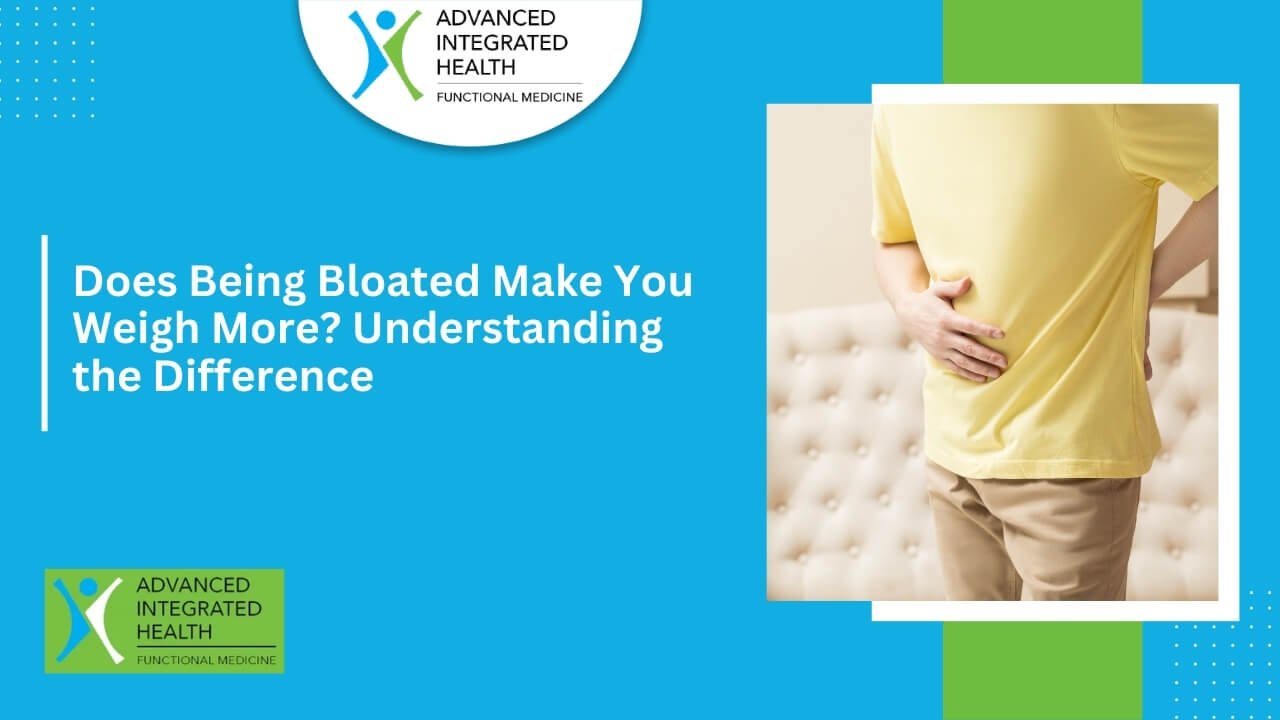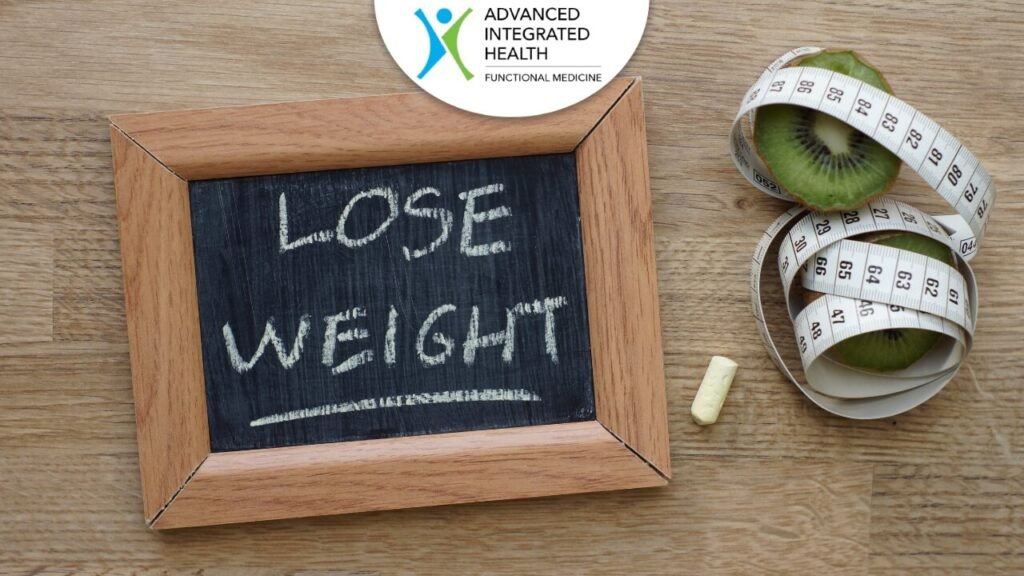The feeling of being bloated can be frustrating and uncomfortable, often leaving people wondering if it has an impact on their weight. Many wonder, “Does being bloated make you weigh more?”
While bloating can cause temporary abdominal distension, it’s important to understand that bloating itself does not lead to weight gain in the sense of fat accumulation. The human body can experience fluctuations in water/ fluid retention due to various factors, but this should not be confused with gaining weight over the long term.
In this article, let’s explore the causes and symptoms of bloating, how it can influence body composition and more.
What is Bloating?
Bloating is a common condition characterized by a sensation of fullness, tightness, or discomfort in the stomach. It often comes with visible abdominal distension or a swollen feeling, making the stomach area appear larger than usual.
The causes of bloating can vary, but it is typically related to temporary issues within the digestive system. Unlike weight gain, which results from body fat accumulation, bloating is generally a short-term condition caused by several factors.
While bloating is typically harmless, frequent or severe episodes may indicate an underlying medical condition, such as irritable bowel syndrome (IBS), food intolerances, or gastrointestinal disorders. If bloating persists for long periods or is accompanied by other symptoms like abdominal pain, nausea, or diarrhea, it’s important to consult a healthcare professional for a proper diagnosis.
Causes of Bloating
There are several common causes of bloating, many of which are tied to your eating habits, lifestyle, and even emotional stress. Understanding these triggers can help you better manage bloating symptoms and prevent them from interfering with your daily life. Here are some of the most prevalent causes of bloating:
1. Eating Certain Foods
Some foods are more likely to cause bloating because they contain complex carbohydrates that are difficult to digest. Cruciferous vegetables like broccoli, cauliflower, and Brussels sprouts, as well as beans, lentils, and certain whole grains, can lead to the production of gas in the stomach. Dairy products can also trigger bloating for lactose intolerant individuals.
2. Hormonal Changes
Hormonal fluctuations, particularly during the menstrual cycle, can contribute to bloating. Many women experience fluid retention and abdominal distension before and during their periods. This type of bloating is temporary and usually resolves after menstruation.
3. Stress and Anxiety
Emotional stress can wreak havoc on your system. Stress can affect how your body processes food, slow down digestion, and lead to feelings of bloating. Managing stress through techniques such as yoga, deep breathing exercises, or even taking a short walk after meals can help alleviate these symptoms.
4. Underlying Medical Conditions
In some cases, bloating is linked to medical conditions such as irritable bowel syndrome (IBS), celiac disease, or food intolerances. These conditions affect the digestive system’s ability to properly break down and absorb food, leading to excessive gas production, abdominal distension, and other uncomfortable symptoms.
Symptoms of Bloating vs. Weight Gain
While both bloating and weight gain can lead to fullness or discomfort in the stomach or abdominal region, there are significant differences in their causes and effects on the body.
Bloating Symptoms
Bloating is typically marked by abdominal distension, a sensation of fullness, and increased gas in the digestive system. You may notice your stomach feeling swollen or tight, which can be accompanied by gurgling sounds, belching, or flatulence.
Weight Gain Symptoms
On the other hand, weight gain is a gradual process that occurs when there is a caloric surplus—meaning the body is consistently consuming more calories than it burns. Over time, this leads to an increase in body fat.
When you gain belly fat or other forms of fat, the weight increase is often noticeable over weeks or months. It’s typically accompanied by a change in clothing fit, an increase in fat percentage, and more noticeable changes in body shape.
The Impact of Bloating on Weight Loss
When you’re on a weight loss journey, bloating can sometimes create the illusion of weight gain or prevent you from seeing true progress. Digestion is easily impacted by dietary changes, stress, and even hormonal fluctuations, which can cause temporary abdominal distension or fluid retention.
These changes may mask the actual progress you’re making in terms of fat loss, leaving you discouraged or uncertain about your results. However, it’s crucial to understand that bloating is not a sustainable or healthy way to lose weight.
How Bloating Affects the Process of Losing Belly Fat
While bloating may make your stomach feel fuller or puffier, it does not contribute to a reduction in belly fat or overall body fat. In fact, bloating can sometimes make it harder to maintain a healthy diet, as it can lead to discomfort after meals, cravings for certain foods, or emotional stress.
Additionally, bloating can impact your motivation to engage in physical activity or exercise, both of which are crucial components of a successful weight loss strategy.
If you’re trying to lose belly fat, focusing on reducing bloating through healthy lifestyle changes can support your overall fitness journey. For example, cutting back on processed foods, reducing your sodium intake, and avoiding carbonated drinks can all help reduce bloating. By addressing these temporary factors, you can stay focused on achieving your long-term fat loss and body composition goals.
How to Manage Bloating While Losing Weight
To manage bloating effectively while pursuing weight loss, it’s important to first identify any potential triggers. Common culprits include certain foods, such as beans, broccoli, or dairy, and drinking water throughout the day to help flush out excess sodium.
Incorporating more lean proteins, healthy fats, and whole grains into your diet can help with digestive health and ease abdominal discomfort. Regular exercise, especially strength training, and activities that help boost metabolism, can also reduce the likelihood of experiencing bloating by improving gut health and fluid retention.
How to Relieve Bloating and Prevent Water Retention
Managing bloating involves identifying the root causes of the discomfort and making lifestyle changes to address them. Since bloating is often tied to fluid retention and gas buildup in the digestive system, there are several strategies you can use to relieve bloating and minimize its occurrence. In this section, we will cover a few effective ways to prevent bloating and promote a healthy digestive system.
Stay Hydrated to Relieve Bloating
One of the most effective ways to reduce bloating is to ensure you’re drinking enough water. Staying hydrated helps to flush out excess sodium and can alleviate fluid retention, one of the primary causes of bloating.
Adjust Your Diet
Your diet plays a key role in reducing bloating. To minimize the chances of bloating symptoms, focus on eating smaller portions throughout the day and avoiding processed foods, which often contain high levels of sodium that contribute to water retention.
Incorporate Regular Physical Activity
Activities such as walking or yoga can help stimulate digestion and reduce fluid retention. Even a short walk after meals can help move gas through the digestive tract and ease abdominal discomfort.
Avoid Stress and Manage Hormonal Fluctuations
Stress and hormonal changes can both contribute to bloating. Stress can slow down digestion, leading to a buildup of gas in the stomach. Practicing relaxation techniques such as deep breathing, meditation, or mindfulness can help reduce the impact of stress on your body.
Managing Body Fat Percentage While Avoiding Bloating
Achieving a healthy fat percentage in your body is an essential part of your weight loss journey, and understanding how bloating can influence the process is key. While bloating might make you feel heavier, it’s important to separate temporary fluid retention from actual body fat. Keeping track of your body fat rather than relying on the scale alone can help you stay focused on your long-term health goals. Bloating doesn’t affect body composition—the proportion of muscle to fat—so it’s crucial to adopt strategies that support fat loss without getting discouraged by short-term fluctuations.
How Bloating Affects Body Composition
Since bloating is a temporary issue, it doesn’t change your body composition. Fluid retention or gas buildup may cause you to feel puffy or swollen in your abdominal area, but it doesn’t impact the fat stored in your body. Tracking fat percentage in the body through tools like fat scales, skinfold calipers, or professional body composition analysis will give you a clearer picture of your progress. This approach allows you to focus on fat loss rather than the misleading effects of temporary bloating.
Key Strategies to Manage Body Fat and Relieve Bloating
To manage fat and bloating simultaneously, focus on a balanced lifestyle that includes:
- Nutrient-dense foods, such as lean proteins, healthy fats, and whole grains, promote fat loss and support digestion.
- Regular exercise, including strength training and aerobic exercises, which can help build muscle and reduce fat in the body.
- Mindful eating habits, such as eating smaller portions throughout the day, prevent overeating, which can cause bloating.
- Hydration, by drinking plenty of water and reducing sodium intake, helps alleviate the retention of water.
Common Mistakes to Avoid When Trying to Lose Weight and Relieve Bloating
While focusing on your weight loss and bloating relief, it’s important to avoid certain common mistakes that can hinder progress and lead to unnecessary frustration. Many people, when faced with abdominal distension or discomfort, make adjustments to their diet or routine that may provide short-term relief but won’t address the underlying causes.
1. Overconsumption of Processed Foods
A common mistake is relying too heavily on processed foods, which can be high in sodium and artificial additives that cause fluid retention and gas. These foods may contribute to bloating and cause you to feel sluggish. Instead, focus on incorporating whole foods like vegetables, lean proteins, healthy fats, and whole grains, which are more likely to support a healthy digestive system and prevent bloating. A balanced diet will not only help you avoid fluid retention but will also keep you feeling energized and on track to lose belly fat.
2. Skipping Meals or Overeating
Skipping meals can slow down your metabolism and lead to overeating later, both of which can trigger bloating and disrupt your digestion. On the other hand, eating large portions in one sitting can overwhelm your stomach, leading to gas buildup and discomfort. To avoid these issues, aim to eat smaller, more frequent meals throughout the day. This helps regulate your blood sugar levels, prevent overeating, and manage your digestive system more effectively.
3. Ignoring the Importance of Gut Health
Your gut bacteria play a significant role in bloating and digestion. Poor gut health can contribute to gas, abdominal discomfort, and even irritable bowel syndrome (IBS). Instead of relying on quick fixes or medications to relieve symptoms, focus on promoting a healthy gut. You can do this by including fiber-rich foods, fermented foods, and probiotics in your diet. A well-balanced microbiome supports both weight loss and bloating relief.
4. Dehydration and Excessive Caffeine
Dehydration can worsen fluid retention and make bloating worse. Not drinking enough water may cause your body to hold onto water unnecessarily. Conversely, excessive caffeine can lead to dehydration and disrupt digestion. Make sure to drink plenty of water throughout the day, and limit caffeinated beverages like iced tea or coffee, especially in the afternoon. Staying hydrated is essential to flush out excess sodium and toxins, which helps to reduce bloating and support your weight loss efforts.
5. Relying on Fad Diets
Many people turn to extreme, fad diets that promise quick results. However, these diets are often unsustainable and can lead to fluid retention, food cravings, or even weight gain in the long term. Instead, focus on balanced eating habits that include healthy fats, lean proteins, and complex carbohydrates. A well-rounded approach to nutrition supports not just weight loss but also overall gut health and wellness.
Wrap-Up
Bloating may temporarily affect your weight and make you feel heavier, but it is not the same as weight gain. While bloating is often caused by factors such as fluid retention, gas buildup, or digestive disturbances, it doesn’t contribute to body fat.
If you’re ready to address bloating symptoms and work on achieving lasting weight loss and overall wellness, Advanced Integrated Health can help. Whether you’re struggling with irritable bowel syndrome, digestive issues, or other health concerns, we provide tailored solutions to help you feel your best. Visit Advanced Integrated Health today to learn more and take the first step toward a healthier, more balanced lifestyle.
Citations
Lord, D. (2024, October 11). Help! Is it Bloating or Weight Gain? Nava Health. https://navacenter.com/help-is-it-bloating-or-weight-gain/
Miller, K. (2023, March 21). Bloating vs. Fat: How to Tell the Difference Between Them. Prevention. https://www.prevention.com/weight-loss/a43341310/bloating-vs-fat/
Professional, C. C. M. (2024b, November 22). Bloated stomach. Cleveland Clinic. https://my.clevelandclinic.org/health/symptoms/21740-bloated-stomach
CPh, R. a. P. R. (2024, January 25). What causes abdominal bloating? https://www.medicalnewstoday.com/articles/321869
Cissn, G. T. P. C. (2023, May 18). The 10 best ways to measure your body fat percentage. Healthline. https://www.healthline.com/nutrition/ways-to-measure-body-fat#:~:text=Skinfold%20Calipers&text=Skinfold%20calipers%20measure%20the%20thickness,vary%20in%20men%20and%20women.
Silver, N. (2020, March 20). 5 tips for managing Period bloating. Healthline. https://www.healthline.com/health/womens-health/period-bloating

Dr. Bob was born and raised in Florham Park, New Jersey.
He loved the philosophy of vitalism, which teaches about the incredible, innate intelligence of our bodies and its power to self-heal when given the opportunity.



